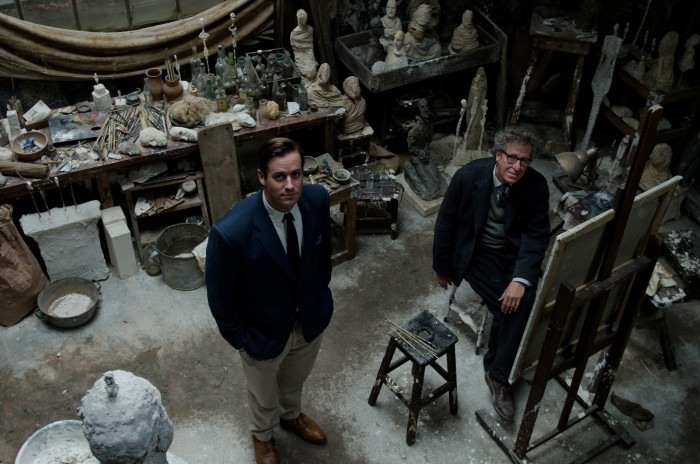Final Portrait

Alberto Giacometti was a sculptor, a painter and an outsider among outsiders. Refusing to be labelled, he dabbled in post-impressionism and surrealism before breaking out on his own, creating his own unique style. Stanley Tucci’s intimate character study, Final Portrait, captures this erratic personality much like the artist captured the spirit of his models, reducing his paintings and sculptures to their bare essences.
The film drops us into the shoes of a young American writer, Jim (Armie Hammer), who is visiting Paris and befriends the Swiss sculptor (Geoffrey Rush) who invites him to pose for his next painting. The naive novelist finds a weathered but cheerfully sardonic old man who is never satisfied with his own work. What starts off as a quick portrait drags on and the young model is asked to stay one, two then three weeks as the artist struggles with his own insecurities and shortcomings.
Geoffrey Rush is absolutely possessed by the spirit of Giacometti: dressed in a baggy suit, hunched over and chain smoking. The veteran actor urges the audience to fall in love with this wistful old man before tearing the curtain down to reveal a conceited, hard-hearted Scrooge who can’t help but wallow in the bleak corners of his studio and wait for death. Jim begins to lose patience as the process drags on and we see the majestic icon of modern art reduced to a faded lady’s man, capable of destroying any hint of joy.
The only light in his life, to the chagrin of his dutiful wife Annette (Sylvie Testud), is a vivacious prostitute, Caroline (Clémence Poésy) who crashes into Giacometti’s world whenever she is in need of attention or adventure. This love triangle is masterfully played out and the artist’s true self is revealed in the parade of betrayals and transgressions.
The action takes place in Paris in the 60s and largely in the painter’s small studio. Giacometti relied on a three-colour palatte for the most part: grey, black and white. The cinematography takes inspiration from this minimal colour scheme but achieves a rich and ample atmosphere for the two characters to interact in – monochrome has never looked so good. The sculptures and paintings begin to blend into the characters in wonderful simulacra.
The finale is hurried but, as Rush’s character explains, “no work of art is ever finished”. Instead we are left with a brief goodbye and news that the artist passes shortly after Jim leaves Paris. The audience does not feel cheated, however, for they learned more from a brief glimpse into Giacometti’s life that they could from any biography. Tucci’s Final Portrait is an impassioned insight into a fascinating character, powered by stirring performances and a sumptuous aesthetic.
Sean Gallen
Final Portrait does not have a UK release date yet.
For further information about the 67th Berlin Film Festival visit here.
Read more reviews from the festival here.
Watch the trailer for Final Portrait here:
https://www.youtube.com/watch?v=2j75HGZcqXg

























Facebook
Twitter
Instagram
YouTube
RSS